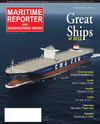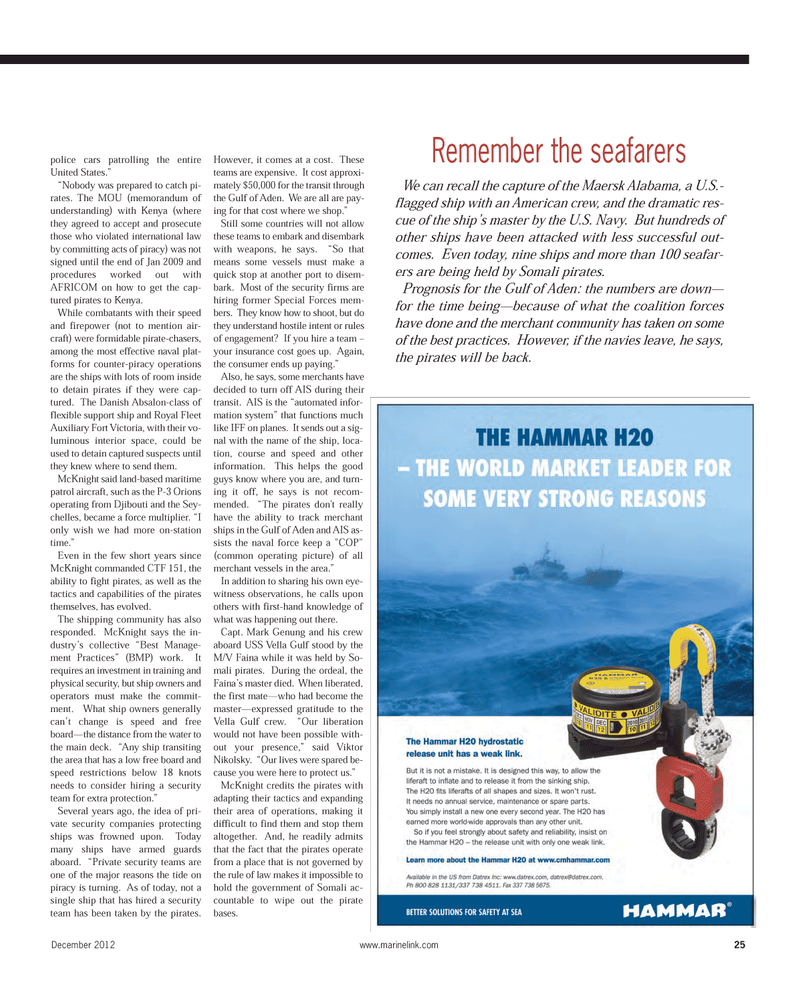
Page 25: of Maritime Reporter Magazine (December 2012)
Great Ships of 2012
Read this page in Pdf, Flash or Html5 edition of December 2012 Maritime Reporter Magazine
December 2012www.marinelink.com 25police cars patrolling the entireUnited States.? ?Nobody was prepared to catch pi- rates. The MOU (memorandum of understanding) with Kenya (where they agreed to accept and prosecute those who violated international law by committing acts of piracy) was not signed until the end of Jan 2009 andprocedures worked out with AFRICOM on how to get the cap- tured pirates to Kenya. While combatants with their speedand firepower (not to mention air- craft) were formidable pirate-chasers,among the most effective naval plat- forms for counter-piracy operations are the ships with lots of room insideto detain pirates if they were cap- tured. The Danish Absalon-class of flexible support ship and Royal Fleet Auxiliary Fort Victoria, with their vo- luminous interior space, could beused to detain captured suspects untilthey knew where to send them. McKnight said land-based maritimepatrol aircraft, such as the P-3 Orionsoperating from Djibouti and the Sey- chelles, became a force multiplier. ?I only wish we had more on-stationtime.? Even in the few short years since McKnight commanded CTF 151, theability to fight pirates, as well as the tactics and capabilities of the piratesthemselves, has evolved. The shipping community has alsoresponded. McKnight says the in-dustry?s collective ?Best Manage- ment Practices? (BMP) work. It requires an investment in training and physical security, but ship owners and operators must make the commit- ment. What ship owners generally can?t change is speed and free board?the distance from the water to the main deck. ?Any ship transiting the area that has a low free board and speed restrictions below 18 knots needs to consider hiring a securityteam for extra protection.? Several years ago, the idea of pri- vate security companies protecting ships was frowned upon. Today many ships have armed guards aboard. ?Private security teams are one of the major reasons the tide onpiracy is turning. As of today, not a single ship that has hired a securityteam has been taken by the pirates. However, it comes at a cost. These teams are expensive. It cost approxi- mately $50,000 for the transit throughthe Gulf of Aden. We are all are pay- ing for that cost where we shop.? Still some countries will not allow these teams to embark and disembarkwith weapons, he says. ?So thatmeans some vessels must make a quick stop at another port to disem-bark. Most of the security firms are hiring former Special Forces mem- bers. They know how to shoot, but do they understand hostile intent or rules of engagement? If you hire a team ? your insurance cost goes up. Again, the consumer ends up paying.? Also, he says, some merchants have decided to turn off AIS during their transit. AIS is the ?automated infor- mation system? that functions muchlike IFF on planes. It sends out a sig- nal with the name of the ship, loca-tion, course and speed and otherinformation. This helps the good guys know where you are, and turn- ing it off, he says is not recom- mended. ?The pirates don't reallyhave the ability to track merchant ships in the Gulf of Aden and AIS as- sists the naval force keep a "COP" (common operating picture) of allmerchant vessels in the area.? In addition to sharing his own eye- witness observations, he calls upon others with first-hand knowledge of what was happening out there. Capt. Mark Genung and his crew aboard USS Vella Gulf stood by the M/V Faina while it was held by So- mali pirates. During the ordeal, theFaina?s master died. When liberated, the first mate?who had become the master?expressed gratitude to the Vella Gulf crew. ?Our liberation would not have been possible with- out your presence,? said Viktor Nikolsky. ?Our lives were spared be- cause you were here to protect us.? McKnight credits the pirates withadapting their tactics and expanding their area of operations, making itdifficult to find them and stop them altogether. And, he readily admits that the fact that the pirates operate from a place that is not governed by the rule of law makes it impossible to hold the government of Somali ac- countable to wipe out the piratebases.Remember the seafarers We can recall the capture of the Maersk Alabama, a U.S.- flagged s hip with an American crew, and the dramatic res- cue of the ship?s master by the U.S. Navy. But hundreds of other ships have been attacked with less successful out- comes. Even today, nine ships and more than 100 seafar- ers are being held by Somali pirates. Prognosis for the Gulf of Aden: the numbers are down? for the time being?because of what the coalition forces have done and the merchant community has taken on some of the best practices. However, if the navies leave, he says, the pirates will be back. MR#12 (18-25):MR Template 12/3/2012 2:06 PM Page 25

 24
24

 26
26
